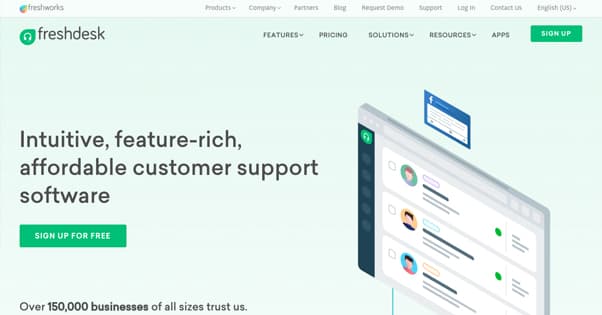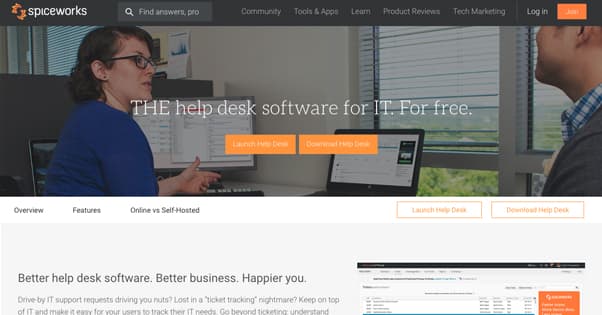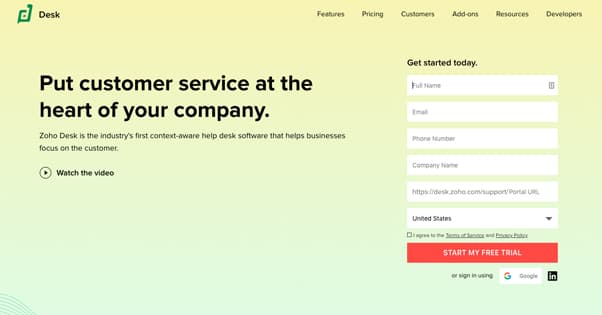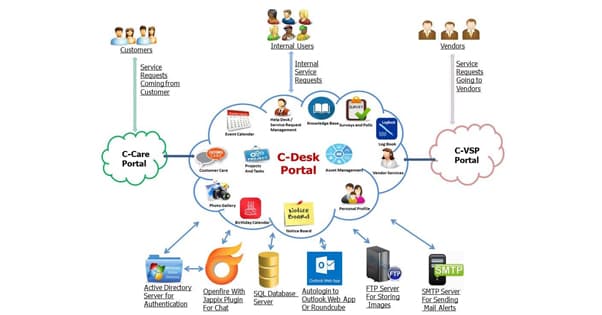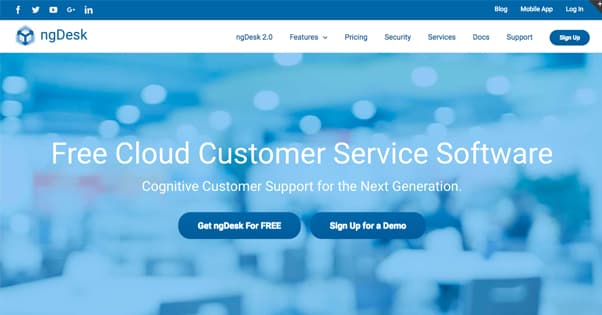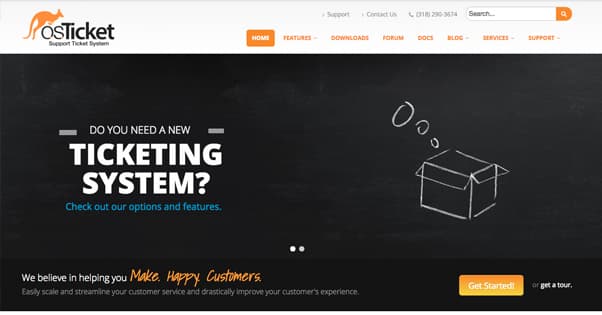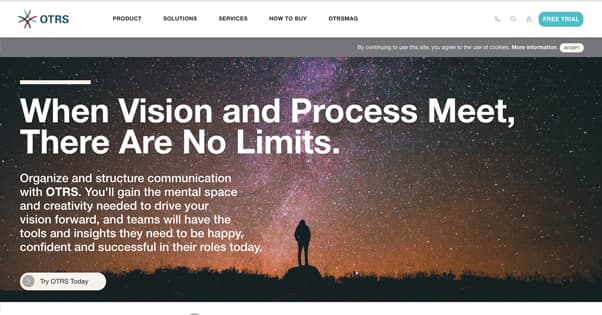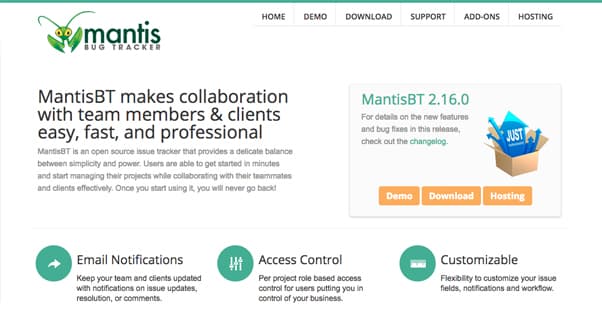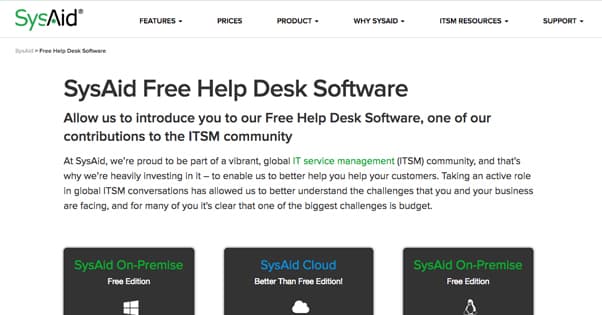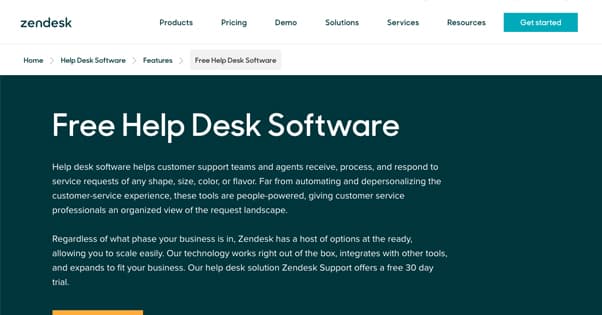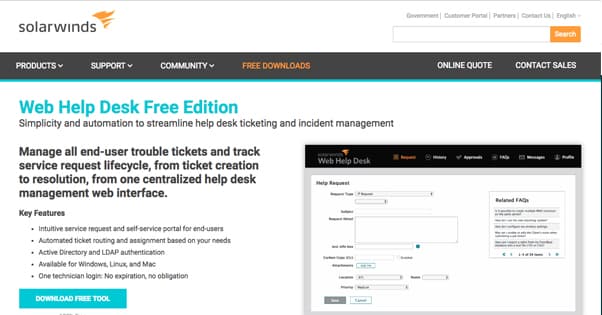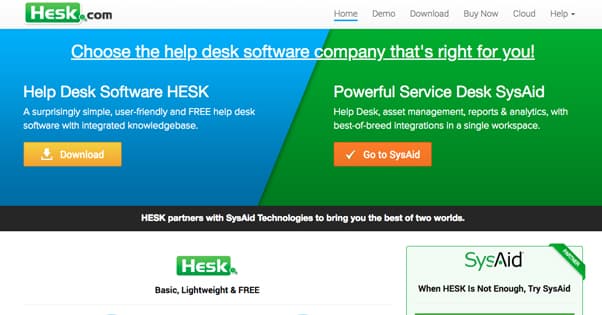List of 30+ Help Desk Software Tools That Are Free to Use

Customer service is a crucial element to any successful business. There are a thousand different ways to handle customer service, from active Twitter responses to email management to helpdesk ticketing systems. No matter how you do it, you absolutely need a system in place. Letting a ticket slip through the cracks is a sure-fire way to destroy your reputation and lose customer loyalty overnight.
I understand that small businesses often need to manage every aspect of their business on a small budget, so that’s why I’ve put together this list. The help desk apps I’ve listed are either totally free, free for small businesses, or free for some amount of limited use. Browse through them and see if there’s one you like.
1. Freshdesk
One of the bigger names in customer service amongst startups in particular, Freshdesk is a pretty good, solid help desk and ticket management suite. It’s available for businesses of all sizes, and their home page boasts clients the likes of HP, American Express, and DHL.
Freshdesk is a great little platform, assuming you’re able to train your customer service team in its use. They have a lot of flexibility and some interesting advanced features, including the ability to gamify customer service in a way that keeps your support team engaged. Unfortunately, that gamification system is not available with the free tier of Freshdesk.
The free tier works with unlimited agents, which is unusual amongst free plans, but it’s limited in functionality. You get email, as well as the most basic phone, social, and chat systems, and a knowledge base. Everything else, like surveys, custom domains, ticket templates, and enterprise-level features are all paid.
2. Spiceworks
Spiceworks is an IT tool provider with a handful of different apps that can be helpful to a business. They have a cloud help desk and a self-hosted help desk, and IP Scanner for network engineers, and an inventory management app, among others. The free version is self-hosted, meaning you need the network infrastructure to handle it, but once you have it set up you’re ready to roll. It also scales well as your business expands.
The drawbacks of Spiceworks, in addition to the need to host it yourself, is primarily in the lack of recent updates. There are some hints that it may be slowly abandoned or end-of-life, though nothing has been announced just yet. Just be aware that you might need to migrate in a few years if it does end up closing down.
3. Zoho Desk
Zoho has a wide array of various business products, ranging from a CRM and a sales app to this help desk portal. They’re a lot more typical of free versions of software; limited in use with plenty of reasons why you might want to upgrade to a paid version.
The free version of Desk, the helpdesk app, is free for up to three agents. You get email inbox management and a help center, knowledge base, and community forum. You also get basic reports, priority SLAs, and a handful of different dashboards for different roles. Unfortunately, you lose out on automation, multi-channel support, and cross-department reports, among other features. Still, it can be a great place to start.
4. ServiceDesk
ServiceDesk, by Manage Engine, is an IT-focused help desk app. It has problem management, incident management, change management, a service catalog, and a lot of reporting available.
I hesitate to mention this for two reasons. First, the free trial is just a trial. Secondly, it doesn’t actually do much other than help desk at the most basic plan, which is $8 per tech per month. Still, if you only have one customer service employee, it’s cheap enough that it’s worth mentioning. Since it’s generally aimed at larger businesses, it scales very well.
5. C-Desk
C-Desk is novel compared to the other options I’ve mentioned thus far, in that it is a completely free help desk solution. It can cover a lot of different bases with help desk, both internal and external. It includes manual asset management, a knowledge base system, and even a photo gallery. It’s totally free with no limit to functions, users, or time on the plan.
The only real downside is that, well, it can be a bit off-putting. Their website looks like something advertising a Windows 95 app, though the software itself is a lot better. It can be tricky to set up, but the configuration options are variable enough that you need someone who knows what they’re doing to get it up and running.
6. ngDesk
This is another option that I hesitate to mention, but for a completely different reason. More on that in a moment. First, ngDesk is completely free, just like C-Desk. It has private chat, call schedules, automatic escalation policies for tickets, and a lot of analytics that can help you identify trends or issues with your business you might not otherwise recognize.
The reason I hesitate to mention this app is actually because they’re on the verge of rolling out a 2.0 version, with a whole new suite of features. With how big of a pain in the ass it can be to set up a new application for your business and train users in using it, you definitely don’t want to set one up only to find a major update with sweeping changes coming down the pipe a few months later. Give this one a look, but keep an eye out for their major update before you go all-in.
Other Free Options
If you don’t need open source but still want something free, you can also consider Mojo Helpdesk, HelpDeskZ, and HelpSpot as further options. They all have free options, generally with some paid support or premium plans to upgrade to later.
7. OSTicket
OSTicket is a ticketing system that is not just free, it’s open source. I know some folks out there love open source options because of how easy they can be to fork and customize for your own business needs. It’s white label due to the open source nature of the program, which means you can brand it and customize it to suit your business easily.
The only real downside with OSTicket is the same downside that comes with every open source application. The majority of the support you get for setting it up or for any bugs you encounter comes from the community. The community is strong and active, but if you encounter something they haven’t seen before, it can be a while before they figure out what the problem is and how to solve it.
8. OTRS
OTRS is another open source option for ticketing and help desk that can scale for businesses of all sizes. It’s globally accessible with 34 languages supported by default, and it has ticket locking to make sure techs aren’t trying to work on the same ticket at the same time.
Perhaps the biggest benefit to OTRS is the ability to automate a lot of requests and simple tasks. On the other hand, learning how to do everything with the program is a job in and of itself; the user manual is hundreds of pages long. Make sure you know what you’re getting into, and that your designated admin for the program is aware of it as well, before you invest heavily in using this program.
9. Mantis
Mantis Bug Tracker is, well, a bug tracking and help desk program. It has a lot of the basic features you’ve come to expect, and it’s open source as well. You can demo it right on their website, download it, or use a hosted version. The hosted version will cost a little, since hosting isn’t free, but the normal self-hosted version is free for everyone.
Mantis also comes with the option to add in various plugins and add-ons to expand its functionality. They have a mobile version that, while kind of basic looking, is still more serviceable than a lot of other apps on a mobile device. They also have a variety of niche plugins ranging from reminders and recurring call apps to email reporting and Gantt Charts. If you need a feature you can’t find, chances are you can find someone who can program something up for you as well. That’s the beauty of open source solutions, after all.
10. Bugzilla
Bugzilla is an open source app in the vein of many older open source apps, with a pretty basic logo, basic website, and basic app at the core. It was used originally by Mozilla when they were first starting out, and has been maintained as a bug tracker and help desk application ever since. It’s open source and free to use, but if you want real support outside of the community, you need to pay for it.
Like Mantis, Bugzilla has a variety of plugins to expand functionality. These third-party add-ons are well-compiled in their wiki, and include a range of different server-side utilities and extra options for end users on both sides of the equation. There’s a lot to dig through and a lot of custom options you can choose, which can make setting it up initially a bit of a chore. That said, once you have it up and running, it’s a great solution.
Other Open Source Options
If you’re fine with the world of open source and all that it entails, there are some other help desk apps you can pick through. Just remember that any open source app lives or dies based on its support, so check out if the community is active before you go all-in.
Such open-source options include Request Tracker, Brimir, PHD Help Desk, Liberum, GLPI, Sinergia, FreeHelpDesk, Adefhelpdesk, eTicket, and Triage.
11. Sysaid
Sysaid has a handful of different IT help desk offerings available to businesses. They have an on-premise edition for both Windows and for Linux architectures, and they have a cloud version if you prefer that.
Sysaid’s free versions only support up to two administrators and only 100 end users, so it’s really only useful for small businesses with small client lists, or for internal applications and support only. They really want you to get the paid version, of course, and while it’s certainly a good upgrade, it’s more than someone looking for free solutions is likely to want to pay.
12. Zendesk
Zendesk is one of the most common help desk and knowledge base systems out there right now. I can almost guarantee that you’ve used it at some point in the past, though you might have only encountered the white label version and not known it was Zendesk at first. Once you recognize it, though, you see it everywhere.
The primary downside to using Zendesk is that the free version may or may not be time-limited. They call it free, but then they push a lot of upsells or conversions to the paid plans, which start at $89 per month per seat for the full suite. This can get really expensive really quickly, so be careful with the contracts you sign.
They do have elements of the suite available for free individually, but some of them are “free” in that the app itself is free but you have to pay for a support plan. Again, read the fineprint.
13. Solarwinds
Solarwinds is another one of the fairly common internal help desk systems, though as an end user you might not have seen it before. They’re fairly aggressive with their sales team, getting any new business they catch wind of set up for a pitch. As far as the system itself, it’s fairly straightforward and relatively easy to set up, with tracking for ticket lifecycles and centralized task management.
The free version comes with ticket management, incident management, SLAs and reporting, with a built-in knowledge base. Advanced features like automation, purchase orders, inventory and billing management, and remote control and support integration are quite a bit more expensive, starting at $700.
14. NABD
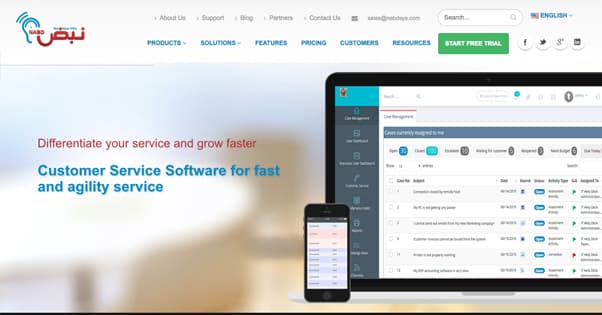
NABD System is a help desk suite with a few different apps, including a customer service portal, a chat system, and a mobile app. The free version aggregates everything in one inbox – paid versions can separate different types of tickets into different inboxes – and can capture support cases from both Facebook and Twitter. It’s also limited to three agents at a time. You do get a knowledge base, basic SLA options, live cycle management for cases, and a whole host of other features. All you miss out on are some of the more advanced features, like sentiment analysis, whitelisting, visitor tracking, and customized analytics.
15. Hesk
Hesk is a simple help desk system made based on PHP. As such, setting it up, configuring it, and troubleshooting it all benefit from having a PHP admin on staff. If you don’t have institutional PHP knowledge, it can be a pain to get running.
Hesk doesn’t have a ton of advanced features, but it’s lightweight. It has an integrated knowledge base, as is common amongst help desk apps. Fortunately, they don’t try to upsell you with a paid plan. Instead, they’re partners with SysAid for their paid plans.
A Few Cheap Options
I’ve already mentioned a few paid options with relatively low costs, so here are a few more you might consider. LiveAgent, Vision Helpdesk, HappyFox, Intercom, Hiver, and Kayako all have relatively cheap plans. You can also investigate anything on this list.


